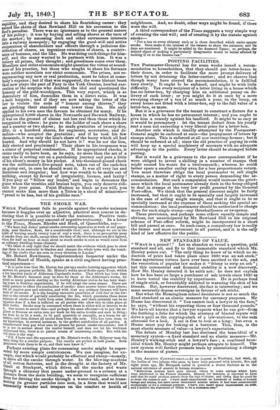THE SMOKE WAR.
WHILE Parliament fails to provide against the smoke nuisance because it boggles over an adjective, practical men concur in de- claring that it is possible to abate the nuisance. Positive testi- mony countervails any amount of negative testimony. In a letter to the Times, Messrs. Rhodes and Meek, of Queenhithe, say— "We have bad Jukes' patent smoke-consuming apparatus at work at our paper- mills, neat Hadlow, Kent, for a considerable time; and, although we are in the habit of burning nearly twenty tons of coal a week, there is no perceptible issue of smoke from our shaft, except when thefires of the two furnaces are first lighted, when for half an hoar at most about as much smoke is seen as would come from an ordinary dwelling-house chimney. "We think it only right that we should assist the evidence which goes to show that there is no necessity to blacken and obscure the whole town with the vomit- ings of the shafts that are seen in every direction in London."
Mr. Robert Rawlinson, Superintendent Inspector under the General Board of Health, speaks as a civil engineer having prac- tical experience-
" It is quite true that Mr. Minton has put up a smoke-burning apparatus which answers its purpose perfectly. Mr. Minton's works are at Stoke-upon-Trent, within a few hundred yards of Alderman Copeland's works. That which has been done for Mr. Minton's furnaces may be done for those at the Alderman's works, for about as many pounds sterling as the worthy Alderman states he has been wast- ing years in fruitless experiments, if he will adopt the same means. There are many patents to effect the combustion of smoke: some answer better than others; but all require care and attention, and with that any ordinary furnace will burn most of its smoke. It is the heaping excessive quantities of cold fuel in the fur- nace to the extent of partially smothering the fire, which generates those dense volumes of smoke Bent forth from some chimnies ; and there certainly can be no injustice done if a fine is inflicted on all parties who allow this to take place at their works. Smoke may be consumed where there is either will or interest to do it One means to secure this—and perhaps the most effectual—is to pay the en- gineer or fireman an extra sum per week for his extra trouble and care in firing; say from Is. to 2s. a week, to be paid quarterly or annually, as a bonus for at- tention; and then deduct all smoke fines from this sum. This has been done, to my knowledge, in several instances, to the perfect satisfaction of all parties. A manufacturer may pay what sum he pleases for patent smoke-consumers; but if be is not in earnest about the matter himself, and does not let his workmen understand this, there is no patent means of consuming smoke. But with the Will there is the way. "P.S. I have seen the apparatus at Mr. Minton's works. Mr. Ridgway uses the tame thing for a similar purpose. The results are perfect in both places. Both gentlemen wish them to be so, and their men know it Perhaps existing plans for consuming smoke might be super- seded by more simple contrivances. We can imagine, for ex- ample, one which would probably be effectual and cheap—namely, to drive all the smoke through water. In the blowing-machine of all cotton factories, and in the draught at the factory of Mr. ,°rTell at Stockport, which drives all the smoke and waste through a chimney that passes under-ground to a column at a distance from the main building, we seem to recognize sufficient force for driving the smoke through a water-tank, and so trans- muting its grosser particles into soot, in a form that would not necessarily wander and trespass on the comfort or health of
neighbours. And, no doubt, other ways might be found, if there were the will.
A third correspondent of the Times suggests a very simple way of creating the said will; and of creating it by the statute against smoke-
" Pat a tax on every chimney such as is there described which emits opaque smoke. Once make it the interest of the owners to abate the nuisance, and its days are numbered. It might be added to the Assessed Taxes; or, perhaps, the desired object of making it particularly disagreeable would be better effected by tacking it on to the Income-tax."


























 Previous page
Previous page